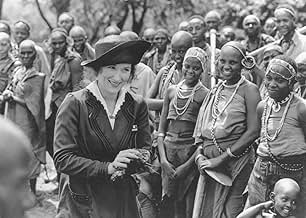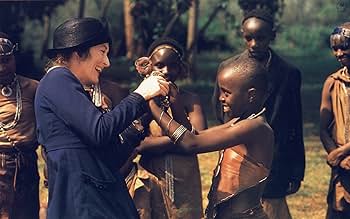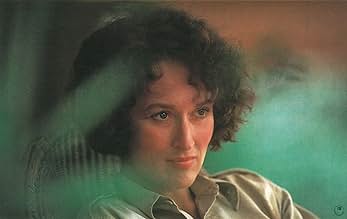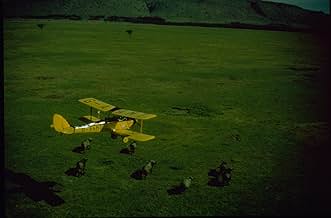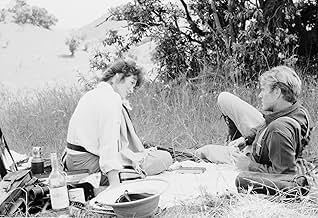Im kolonialen Kenia des 20. Jahrhunderts hat eine dänische Baronin/Plantagenbesitzerin eine leidenschaftliche Liebesaffäre mit einem freigeistigen Großwildjäger.Im kolonialen Kenia des 20. Jahrhunderts hat eine dänische Baronin/Plantagenbesitzerin eine leidenschaftliche Liebesaffäre mit einem freigeistigen Großwildjäger.Im kolonialen Kenia des 20. Jahrhunderts hat eine dänische Baronin/Plantagenbesitzerin eine leidenschaftliche Liebesaffäre mit einem freigeistigen Großwildjäger.
- 7 Oscars gewonnen
- 30 Gewinne & 31 Nominierungen insgesamt
Empfohlene Bewertungen
This really is a beautiful movie. The cinematography is outstanding. The Kenyan landscape is truly majestic. It's no wonder why the Forerunners chose Voi as their location for the portal to the Ark (Halo 3 reference ;)).
Robert Redford was the MAN in this, as I'm sure he is in real life. His free spirit that he simply would not yield was commendable. I don't know how he wasn't even nominated for an Academy Award that year. Streep was very good too, and well deserving of her award.
At 2 hours and 41 minutes it felt a little long. I did not watch it through one sitting, and I think it would have been difficult had I done so.
Karen Blixen left Africa knowing exactly how special of a place it was. From the people to the animals and the land itself, there's nothing quite like it. I just hope we as the human race can preserve this precious place, and not the opposite.
Robert Redford was the MAN in this, as I'm sure he is in real life. His free spirit that he simply would not yield was commendable. I don't know how he wasn't even nominated for an Academy Award that year. Streep was very good too, and well deserving of her award.
At 2 hours and 41 minutes it felt a little long. I did not watch it through one sitting, and I think it would have been difficult had I done so.
Karen Blixen left Africa knowing exactly how special of a place it was. From the people to the animals and the land itself, there's nothing quite like it. I just hope we as the human race can preserve this precious place, and not the opposite.
My favorite movie of all time, hands down. I watched it for the first time in the theatre. As it ended, the audience sat motionless and quiet for several beats, then burst into loud applause as the ending credits rolled. I'm not always so prophetic, but I was incredibly moved. I said to my husband, "We've just seen the Academy Award winner." If I had no other basis for recommendation, I would say the breathtaking cinematography and transporting musical score would make a viewing worthwhile (case in point: the main theme playing as Denys Finch Hatton gives Karen Blixen her first airplane ride, and we what she sees, as God must have seen it). But these are merely the window dressings.
There are two movie cuts floating around, which I tried to pursue through Universal, and then Disney. Forget it. Suffice to say there is a theatrical version and a Disney TV version, with little consequential difference to the plot except that the latter edits out a little of Karen's physical lovemaking with Denys and slightly expands her intellectual relationship with Farah; which to some degree helped buttress the development of his absolute devotion to her.
The screenplay resembles Isaak Dinesen's semi-autobiographical book very little; even so, she did not tell the whole truth in her book. You'll have to get over it, except that I think the character development suffered the loss of Blixen's deep involvement with the displaced Kikuyu tribe working her coffee plantation. Also, without an understanding of the historical times, it would be too easy to say simplistically that this is a woman trying to live within the terms of a marriage of convenience and then compensating with pursuit of a doomed passion.
What was crafted out of a mishmash of a more-or-less factual account and director Sydney Pollack's vision is still a beautiful love and adventure story in the midst of British colonial rule and an earlier, more racially and sexually biased era.
Klaus Maria Brandauer as Baron Bror von Blixen (whew! - who called Karen "Tannen," adding to my initial confusion) perfectly portrays that fun man you like immensely but could never really trust with anything important like your feelings. He along with several of the key male figures and symbols in this movie will eventually bow in respect to the "man" Karen Blixen becomes despite his often shabby treatment and other travails, because she rises above it all and perseveres. Redford plays mostly Redford. His Finch Hatton's sense of independence is fragile and illusory and will ultimately cost him dearly.
There are a couple of continuity problems that bother me to this day, including the disappearing-reappearing champagne and the continually retracking parade marchers, but for the most part few expenses or attentions to detail were spared, especially in the lavish costuming. "Bare-breasted native women" will unfortunately also make their National Geographic appearance.
Even so, Out of Africa is a treasure with a half dozen or more perfect and unforgettable scenes; a movie as long as this review, but I hope you'll agree, worth your patience.
There are two movie cuts floating around, which I tried to pursue through Universal, and then Disney. Forget it. Suffice to say there is a theatrical version and a Disney TV version, with little consequential difference to the plot except that the latter edits out a little of Karen's physical lovemaking with Denys and slightly expands her intellectual relationship with Farah; which to some degree helped buttress the development of his absolute devotion to her.
The screenplay resembles Isaak Dinesen's semi-autobiographical book very little; even so, she did not tell the whole truth in her book. You'll have to get over it, except that I think the character development suffered the loss of Blixen's deep involvement with the displaced Kikuyu tribe working her coffee plantation. Also, without an understanding of the historical times, it would be too easy to say simplistically that this is a woman trying to live within the terms of a marriage of convenience and then compensating with pursuit of a doomed passion.
What was crafted out of a mishmash of a more-or-less factual account and director Sydney Pollack's vision is still a beautiful love and adventure story in the midst of British colonial rule and an earlier, more racially and sexually biased era.
Klaus Maria Brandauer as Baron Bror von Blixen (whew! - who called Karen "Tannen," adding to my initial confusion) perfectly portrays that fun man you like immensely but could never really trust with anything important like your feelings. He along with several of the key male figures and symbols in this movie will eventually bow in respect to the "man" Karen Blixen becomes despite his often shabby treatment and other travails, because she rises above it all and perseveres. Redford plays mostly Redford. His Finch Hatton's sense of independence is fragile and illusory and will ultimately cost him dearly.
There are a couple of continuity problems that bother me to this day, including the disappearing-reappearing champagne and the continually retracking parade marchers, but for the most part few expenses or attentions to detail were spared, especially in the lavish costuming. "Bare-breasted native women" will unfortunately also make their National Geographic appearance.
Even so, Out of Africa is a treasure with a half dozen or more perfect and unforgettable scenes; a movie as long as this review, but I hope you'll agree, worth your patience.
It's hard to describe this film. On one hand, it's long and slow; on the other, it's an absorbing story with fantastic acting and breathtaking scenery.
Meryl Streep stars as Karen Blixen, a Danish woman, who marries Bror Blixen and becomes a Baroness. The couple move to Africa in 1913 and start a coffee plantation.
Blixen cheats on her and is away often for business, while she stays at home working the plantation. Ultimately he gives her VD.
She falls in love with Denys Finch-Hatton (Robert Redford). The relationship is frustrating for her -- Denys does not want a commitment, he wanted freedom. When she returns to her native country, she writes about her experience as Isak Dinesen.
The film shows a lot of interesting history: the class consciousness, for one, as Karen was looked down on because of her humble beginnings. Also, it shows Europeans trying to impose their culture on a foreign people.
It definitely portrays how the different tribes saw the Europeans, basically as people who did not belong there.
It also shows the simplicity of the natives, and how their knowledge of their own country was superior. All of this is before World War II and very interesting.
Interestingly, Sikh Indians are brought to the English Gentlemen's club to act as servants and when Karen dares to enter the men's only den, it's the Sikh who is responsible for escorting her out; none of the English "gentlemen" have the balls or nerve to do it. An interesting observation on the English White man's view of the world before World War I.
Many of the lesser characters were real people. Kumante was apparently consulted by the filmmakers. Felicity is based on aviatrix Beryl Markham.
The cast includes Klaus Maria Brandauer, Michael Kitchen, Michael Gough, and Rachel Kempson, all wonderful actors.
Meryl Streep does a beautiful job as Karen/Isak. Robert Redford is miscast as Denys, who is supposed to be a British aristocrat. If he speaks with an American accent, he can't be a British aristocrat. Apparently Redford used an accent but Sydney Pollack made him overdub his lines; he thought they would distract the audience.
I think he should have been encouraged to work on and use the accent so his portrayal could have closer to the real man. As it is, he comes off as miscast -- and American. He also doesn't register as well as he could, given his looks and charm.
The scenery in this film is the true star. So many of us don't have a strong picture of Africa; this film displays its great beauty.
Interestingly, the story of Isak Dinesen was considered for Greta Garbo, and Audrey Hepburn was offered the role before Streep.
Meryl Streep stars as Karen Blixen, a Danish woman, who marries Bror Blixen and becomes a Baroness. The couple move to Africa in 1913 and start a coffee plantation.
Blixen cheats on her and is away often for business, while she stays at home working the plantation. Ultimately he gives her VD.
She falls in love with Denys Finch-Hatton (Robert Redford). The relationship is frustrating for her -- Denys does not want a commitment, he wanted freedom. When she returns to her native country, she writes about her experience as Isak Dinesen.
The film shows a lot of interesting history: the class consciousness, for one, as Karen was looked down on because of her humble beginnings. Also, it shows Europeans trying to impose their culture on a foreign people.
It definitely portrays how the different tribes saw the Europeans, basically as people who did not belong there.
It also shows the simplicity of the natives, and how their knowledge of their own country was superior. All of this is before World War II and very interesting.
Interestingly, Sikh Indians are brought to the English Gentlemen's club to act as servants and when Karen dares to enter the men's only den, it's the Sikh who is responsible for escorting her out; none of the English "gentlemen" have the balls or nerve to do it. An interesting observation on the English White man's view of the world before World War I.
Many of the lesser characters were real people. Kumante was apparently consulted by the filmmakers. Felicity is based on aviatrix Beryl Markham.
The cast includes Klaus Maria Brandauer, Michael Kitchen, Michael Gough, and Rachel Kempson, all wonderful actors.
Meryl Streep does a beautiful job as Karen/Isak. Robert Redford is miscast as Denys, who is supposed to be a British aristocrat. If he speaks with an American accent, he can't be a British aristocrat. Apparently Redford used an accent but Sydney Pollack made him overdub his lines; he thought they would distract the audience.
I think he should have been encouraged to work on and use the accent so his portrayal could have closer to the real man. As it is, he comes off as miscast -- and American. He also doesn't register as well as he could, given his looks and charm.
The scenery in this film is the true star. So many of us don't have a strong picture of Africa; this film displays its great beauty.
Interestingly, the story of Isak Dinesen was considered for Greta Garbo, and Audrey Hepburn was offered the role before Streep.
Wonderful film. Great in every detail. Director Sydney Pollack captures every nuance of time and place, and the cast is perfection. Meryl Streep is a total wonder as the Danish woman who goes to Africa to find a life but learns about love instead. Robert Redford was much maligned when this film was released in 1985 but now seems quite fine. Michael Kitchen, Rachel Kempson, Suzanna Hamilton, and Michael Gough are all good. John Barry's beautiful score is among the best in film history: a perfect melding of times past and wistfulness and love. Gorgeous African vistas serve as a backdrop for the love story between Streep and Redford, playing real-life characters Isaak Dineson and Dennis Finch-Hatton. But this is not just a movie romance. It's a story about loss: the loss of love, the loss on innocence, the loss beauty. And it's all symbolized by the loss of Africa. War, mechanization, imperialism, westernization, progress are the evils of the early 19th century just as they are today. But the heart of this film is Meryl Streep's flawless performance. She is a wonder.
Fifty years ago I was living in the Kenya highlands, only a few miles from the old Blixen farm. Not a great deal had changed since the 1920s, the period of the movie, which manages a reasonable re-creation. However, the background is unlikely to mean much to Americans, only confirming unreal stereotypes of the colonial British. Meryl Steep, as we have come to expect, is superb in the part; and in 2003 she co-narrated a wonderful documentary on the remarkable Karen Blixen (Isak Dinesen), to whom in fact she bears some physical resemblance. Robert Redford is badly miscast, and why the producers didn't get one of many superb English actors for the part I can't imagine. As a love story well told in what to most people will be an exotic setting, beautifully photographed, it should be highly rated, justifying its many awards.
Oscars Best Picture Winners, Ranked
Oscars Best Picture Winners, Ranked
See the complete list of Oscars Best Picture winners, ranked by IMDb ratings.
Wusstest du schon
- WissenswertesEarly in the film, Baroness Karen Blixen is introduced to her servants. Although the scene is inter-cut with close-ups and other inserts in the film, the first take was filmed as one long shot that required Meryl Streep to meet and exchange dialogue with several other characters. As soon as director Sydney Pollack yelled "Cut", Streep, wearing a high-collared shirt and snug jacket, yelled "get this thing off of me!" and ripped open her jacket. A large beetle had crawled down the front of the jacket moments after the camera rolled, yet she continued filming the scene. Much of it remains in the final film.
- PatzerDuring the lion attack, Denys pulls an additional two spare cartridges from his belt as a ready reload. However, he carries them with his right hand, his trigger hand, which also is the hand needed to break the action to reload. No experienced double-gun hunter would do this. The two reload cartridges must be carried in the left hand, leaving the right hand free to manipulate the rifle.
- Zitate
Karen Blixen: It's an odd feeling, farewell. There is such envy in it. Men go off to be tested, for courage. And if we're tested at all, it's for patience, for doing without, for how well we can endure loneliness.
- Crazy CreditsEpilogue: "Karen Blixen published her first stories in 1934 under the name Isak Dinesen. She never returned to Africa."
- Alternative VersionenNetwork TV version features additional footage not included in theatrical release.
- VerbindungenEdited into A Song of Africa (2000)
- SoundtracksConcerto for clarinet and orchestra in A (K.622)
Written by Wolfgang Amadeus Mozart
Performed by Jack Brymer Clarinet, The Academy of St. Martin-in-the-Fields
Directed by Neville Marriner
Used Courtesy of Philips Classic Productions, The Netherlands
Top-Auswahl
Melde dich zum Bewerten an und greife auf die Watchlist für personalisierte Empfehlungen zu.
- How long is Out of Africa?Powered by Alexa
Details
- Erscheinungsdatum
- Herkunftsland
- Offizieller Standort
- Sprachen
- Auch bekannt als
- África mía
- Drehorte
- Produktionsfirma
- Weitere beteiligte Unternehmen bei IMDbPro anzeigen
Box Office
- Budget
- 31.000.000 $ (geschätzt)
- Bruttoertrag in den USA und Kanada
- 87.071.205 $
- Eröffnungswochenende in den USA und in Kanada
- 3.637.290 $
- 22. Dez. 1985
- Weltweiter Bruttoertrag
- 227.514.205 $
- Laufzeit2 Stunden 41 Minuten
- Farbe
- Seitenverhältnis
- 1.85 : 1
Zu dieser Seite beitragen
Bearbeitung vorschlagen oder fehlenden Inhalt hinzufügen

Oberste Lücke
By what name was Jenseits von Afrika (1985) officially released in India in Hindi?
Antwort


